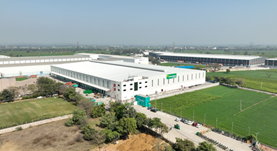Bharat Bhushan Rathi, Head – Distribution and Logistics, Mankind Pharma, discusses the future of pharmaceutical air cargo, highlighting the expanding market, compliance challenges, safety concerns, and the need for sustainable practices. With the right strategies, the industry can ensure better, faster delivery of life-saving products.

Pharmaceutical air cargo demand rises, but complex challenges require immediate attention
The pharmaceutical air cargo industry is taking flight, fuelled by the increasing demand for fast, efficient, and secure transportation of temperature-sensitive products. Bharat Bhushan underscores that air transport is crucial in reducing exposure to environmental variables, especially for critical pharmaceutical shipments. As more airports open in B-class cities, air cargo is becoming the go-to option for quick deliveries, addressing the unpredictable demand across various regions. With this growth, this sector is poised to leverage air logistics for safe and timely delivery.
Tackling the challenges
While the demand for pharmaceutical air cargo soars, the industry faces complex challenges that need immediate attention. One of the major hurdles is the multimodal nature of air logistics. With shippers, service providers, aggregators, and airlines often using different platforms, tracking shipments and ensuring seamless coordination becomes a challenge. Rathi highlights the “blackout period” when shipments are handed over to airport security, leaving them exposed and vulnerable. Moreover, proper handling instructions aren’t always followed, and poorly trained personnel can risk the integrity of pharmaceutical products. To maintain the efficacy of these life-saving goods, the industry must come together to streamline processes and ensure that only trained professionals handle such critical shipments.
Geopolitical tensions: A growing concern
Geopolitical tensions and trade restrictions are reshaping the global air cargo landscape, affecting pharmaceutical shipments. With cross-border trade relying on stable international relations, disruptions can cause significant delays and cost implications. One way to mitigate these risks is by partnering with reliable service providers who have proven experience in managing pharmaceutical shipments. Additionally, keeping a close watch on international developments and their potential impacts on the supply chain will help the industry stay ahead of the curve and ensure continuous, efficient deliveries.
Common myths
Misconceptions in pharmaceutical air cargo include the belief that all shipments are temperature-controlled and that anyone can handle them. In reality, temperature control depends on the product’s value and criticality, and only trained professionals should manage pharmaceutical shipments to ensure their safety and effectiveness.
Sustainability takes flight
Sustainability in pharmaceutical air cargo is addressed through eco-friendly practices like reusable passive packaging, which maintains temperature control without excessive waste. These solutions are crucial as the industry grows and strives for more sustainable practices.
A bright future
Looking ahead, the pharmaceutical air cargo industry is poised for significant growth. By addressing challenges like compliance, safety, and geopolitical risks and embracing sustainable practices, the sector is setting the stage for more efficient, eco-friendly deliveries. With the right innovations and strategies in place, the industry will continue to meet the rising demand for pharmaceutical shipments, ensuring that life-saving products reach their destinations swiftly and safely. The future of pharma air cargo looks not only promising but essential to global healthcare.











